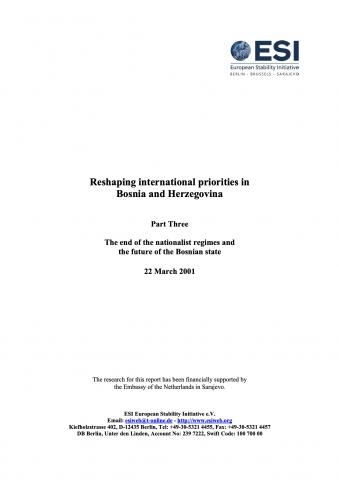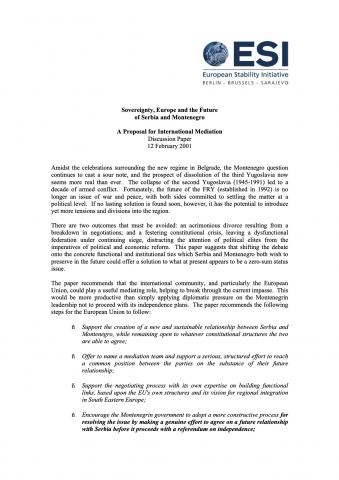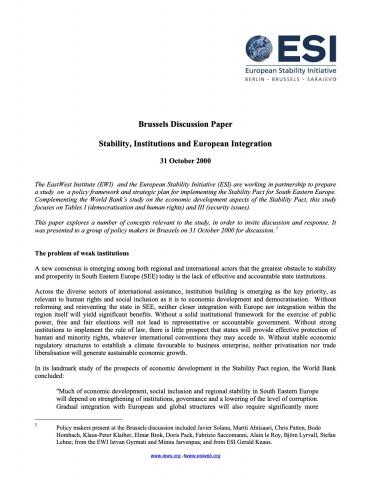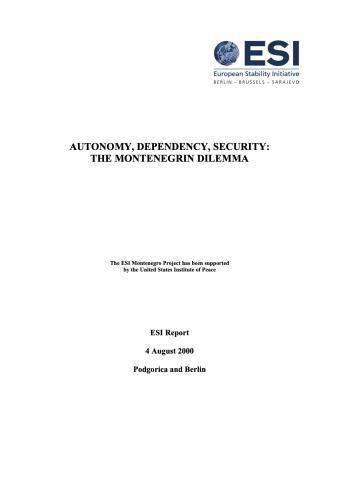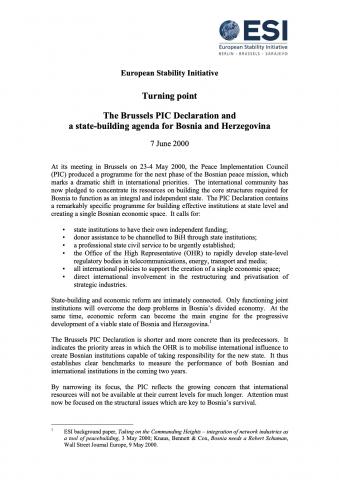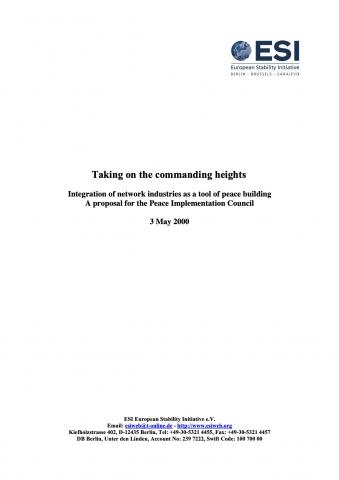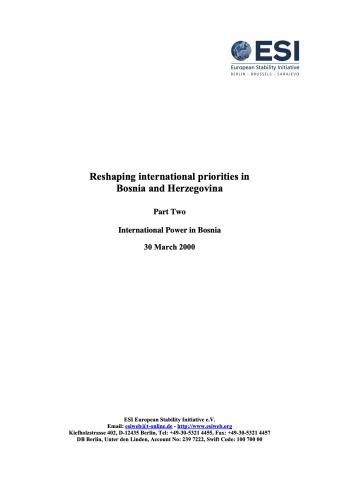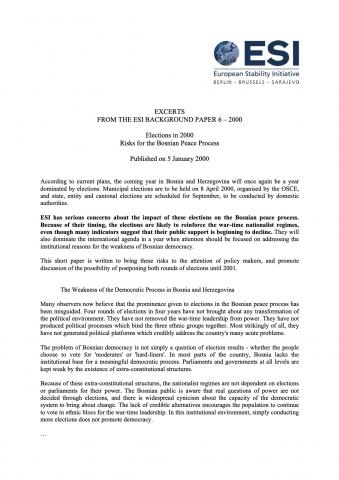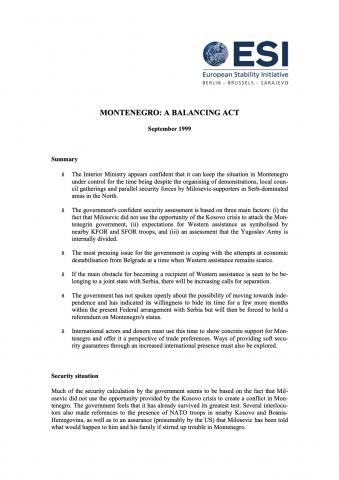Publications
155 PublicationsDemocracy, Security And The Future Of The Stability Pact For South Eastern Europe
The Stability Pact reflected an extraordinary consensus among the wider international community and the states of the region that something had to be done to address the problems of instability in South Eastern Europe at their source, breaking once and for all the cycle of conflict. Following a decade of reactive crisis management, the Pact was to be a "turning point" after "too many false dawns, too many shattered hopes and lives, too many tensions left unresolved".
Reshaping International Priorities In Bosnia And Herzegovina - Part III The End Of The Nationalist Regimes And The Future Of The Bosnian State
Over the last two years, Bosnia has changed dramatically. The ethnic power structures left over from the war have begun to crumble. Political changes in Croatia and Serbia have cut external revenues, forcing the political elites in Bosnia to reorient themselves towards the international community and participate in the Bosnian state. With the right focus of international efforts, the core Dayton agenda can be completed within the next 2-3 years.
Sovereignty, Europe and the future of Serbia and Montenegro - A proposal for international mediation
Amidst the celebrations surrounding the new regime in Belgrade, the prospect of dissolution of the third Yugoslavia now seems more real than ever. Fortunately, the future of the FRY s no longer an issue of war and peace, with both sides committed to settling the matter at a political level. If no lasting solution is found soon, however, it has the potential to introduce yet more tensions and divisions into the region.
Stability, Institutions And European Integration - Brussels Discussion Paper
A new consensus is emerging that the greatest obstacle to stability and prosperity in South Eastern Europe today is the lack of effective and accountable state institutions. Without a solid institutional framework for the exercise of public power, free and fair elections will not lead to representative or accountable government. Without strong institutions to implement the rule of law, there is little prospect that states will provide effective protection of human and minority rights, whatever international conventions they may accede to.
Autonomy, dependency, security: The Montenegrin dilemma
Since the Montenegrin government distanced itself from the president of the Federal Republic of Yugoslavia, Slobodan Milosevic, during last year's Kosovo war, Montenegro has found itself in the international spotlight. Montenegrin politicians have been courted by the West. The United States and the European Union have offered rapid and substantial financial aid
Turning Point: The Brussels PIC Declaration And A State-Building Agenda For Bosnia And Herzegovina
State-building and economic reform are deeply linked; functioning institutions can remedy Bosnia's fragmented economy, and economic reform can drive state development. The Brussels PIC Declaration provides concrete priority areas for the OHR to build Bosnian institutions, establishing clear benchmarks to measure performance of Bosnian and international institutions over the next two years.
Taking On The Commanding Heights - Integration Of Network Industries As A Tool Of Peace Building - A Proposal For The Peace Implementation Council
The key international objectives in Bosnia and Herzegovina are building an effective state, breaking the hold of unaccountable war-time power structures, creating conditions for economic growth and laying a basis for closer integration with European institutions. An international focus on institution building at the commanding heights of the political economy offers an outstanding opportunity to advance each of these goals.
Reshaping International Priorities In Bosnia And Herzegovina - Part II International Power In Bosnia
The international community has the potential to exercise considerable power in Bosnia. However, it has been slow at learning the lessons of its successes, and at understanding the sources of its influence. The limited progress in the peace process is attributable in large part to the failure of the international community to understand international power as a resource which must be used strategically in support of the peace mission.
Power And Strategy In Bosnia And Herzegovina - ESI Stockholm Discussion For The Stockholm Seminar On Bosnia And Herzegovina
This paper, part of the ESI series Changing International Priorities in Bosnia and Herzegovina, discusses prerequisites for a successful medium-term strategy in Bosnia ahead of the upcoming Peace Implementation Council (PIC) meeting. It studies international influence in Bosnia, state and institution building, international agenda setting, the PIC's role, and deriving insights from peace process successes.
Elections In 2000 Risks For The Bosnian Peace Process
According to current plans, the coming year in Bosnia and Herzegovina will once again be a year dominated by elections. ESI has serious concerns about the impact of these elections on the Bosnian peace process. Because of their timing, the elections are likely to reinforce the war-time nationalist regimes. They will also dominate the international agenda in a year when attention should be focused on addressing the institutional reasons for the weakness of Bosnian democracy.
Montenegro: Issues and questions
As municipalities are passing resolutions to assert their autonomy from Podgorica, a real threat of parallel structures consolidating in parts of Montenegro prevails. The extent of authority of the Podgorica administration is being challenged, even holding a referendum on independence in these areas is considered impossible by some observers. The Montenegrin Interior Ministry continues to remain confident that it can maintain control of a complex security situation.
Reshaping International Priorities In Bosnia And Herzegovina - Part I - Bosnian Power Structures
Until now, the evolution of international power in Bosnia has occurred haphazardly, in response to events on the ground rather than according to a strategic vision. If international support is withdrawn in the absence of self-sustaining domestic structures, the peace process may falter, and many of the gains made to date will be lost. The concept of "ownership" of the Bosnian peace process raises an obvious question: to which individuals or local institutions should "ownership" be entrusted?
Montenegro: A balancing Act
Opposition figures warn of special protection forces and organized gatherings and tribal council meetings in the Serb-majority areas in the North of Montenegro. The financial support given to Montenegro by the international community is claimed to be less than Milosevic's support to the SNP. Conversely, if the main obstacle for becoming a recipient of Western assistance is seen to be belonging to a joint state with Serbia (e.g. World Bank policy), there will be increasing calls for separation.
Interim Evaluation Of Reconstruction And Return Task Force (RRTF)
Assisting displaced Bosnians return to their homes in areas controlled by the military of another ethnic group, so-called minority returns, has proved one of the most difficult challenges of the peace process. While progress was slow initially, returns have accelerated in 1999 to previously inaccessible areas. The Return and Reconstruction Task Force's on-the-ground expertise has been key in brokering returns and monitoring conditions.
The Stability Pact And Lessons From A Decade Of Regional Initiatives
The 1990s saw the creation of several regional initiatives in South Eastern Europe following historical turning points like the end of the Cold War and the Bosnian War. These had overlapping objectives, expanding memberships, focused on meetings not implementation, and lacked strategic vision and impact assessment. The Stability Pact faces challenges to develop clear priorities, implementation mechanisms, mobilize resources, gain visibility, and promote real institution building.


